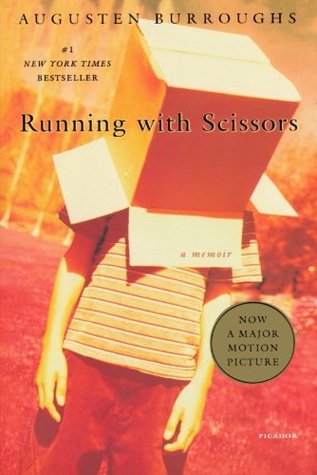If any writer has mastered the art of finding humor in the grotesque, it’s Augusten Burroughs. Really, he had no choice. If he had taken to heart every trauma of his childhood, he would never have made it to adulthood—much less to his status as a New York Times bestselling author. As my grandmother always tells me, ‘If you don’t laugh, you’ll cry’—and Burroughs’s memoir, RUNNING WITH SCISSORS, exemplifies this philosophy.
Burroughs grew up in Western Massachusetts, adjacent to the Smith College campus, an idyllic setting that provides a stark contrast to the chaos of his youth. His early memories are of vicious fights between his mentally unstable mother and his alcoholic father, who part ways when he is twelve. Shortly thereafter, his father takes leave of the family and becomes completely unresponsive to Augusten’s attempts at communication.
Meanwhile, as his mother succumbs to increasingly frequent psychotic episodes, she and Augusten begin to spend time with Dr. Alan Finch, a psychologist with decidedly unorthodox practices. His filthy house is in a state of disrepair, and his tenants include former and current patients in varying states of mental decay. In the grips of psychosis, Augusten’s mother does the unthinkable: she signs Augusten over to Dr. Finch, who becomes his legal guardian.
From this point forward, Augusten finds himself enmeshed in the dysfunctional and downright bizarre antics of his adopted family. At thirteen, struggling to come to terms with his homosexuality, he becomes romantically involved with Neil Bookman—a thirty-three-year-old man who is an adopted son and former patient of Dr. Finch’s. Around this time, Augusten begins to plot ways to drop out of school.
With Finch’s guidance and his mother’s support, he stages an elaborate suicide attempt that will keep him out of school for months—after the minor inconvenience of a stay at the mental hospital. He fills his days writing in his journal and daydreaming about the future, in which he will reside over a hair-product empire, or conversely destroying the kitchen ceiling in order to create a “skylight” with Finch’s daughter, Natalie. These anecdotes only scratch at the surface of the deeply depraved behaviors he witnesses and mimics in the Finch household.
In RUNNING WITH SCISSORS, Burroughs recalls the outrageous events of his adolescence and the instability of the adults who surround him with both unfaltering candidness and biting humor. When Natalie tells Augusten, “You really should write all this stuff down,” he replies, “Even if I did, nobody would believe it.” Natalie reconsiders: “That’s true…maybe it’s better to just forget it.” Fortunately, Burroughs chooses to reanimate the events of his childhood and allow the truth to endure, despite ensuing accusations of defamation from the real-life Finches.
I’ve read my fair share of bizarre, unbelievable memoirs. These have inspired a variety of responses, from shock to reflection to deep gratitude for my “normal” upbringing. But only this one has made me snicker uncontrollably on the subway, mimicking the lunacy of the colorful cast of characters portrayed within its pages.








